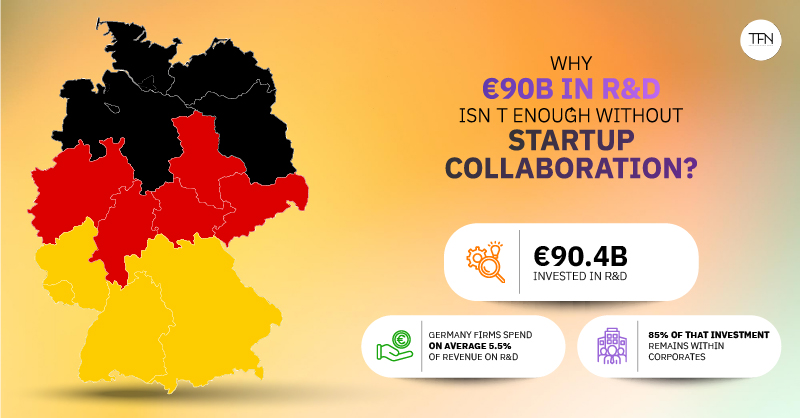Science
Germany’s €90B R&D Investment Needs Startup Collaboration to Thrive

Germany is grappling with an innovation paradox, as its corporations invested a staggering €90.4 billion in research and development (R&D) in 2023. This substantial financial commitment positions the nation among the top global spenders on innovation, according to a recent study by Speedinvest and Bits&Pretzels. Despite this impressive figure, over 85% of the investment remains confined within corporate walls, limiting the involvement of startups in shaping the innovation landscape. This cautious approach raises concerns about Germany’s ability to keep pace with advancements in artificial intelligence (AI) and deep tech.
In stark contrast, leading U.S. tech giants such as Alphabet, Amazon, and Meta allocate approximately 30% of their R&D budgets toward startups, fostering an environment of external innovation. German industrial leaders, including Volkswagen and Bosch, restrict nearly 90% of their innovation expenditures to internal research facilities, which may hinder their competitive edge in a rapidly evolving tech landscape.
The changing dynamics of corporate venture capital (CVC) are becoming increasingly evident. Ion Hauer, Principal at APEX Ventures, notes, “Our market data suggests we are not at a single ‘tipping point’ but rather in a period of accelerated, sector-specific transition.” The growth of CVC is shifting focus towards Seed and Series A funding rounds, particularly in deep tech sectors such as quantum computing, AI-driven material science, and industrial automation.
Challenges in Scaling Innovations
While Germany excels in piloting innovative projects, the scaling of these initiatives often proves challenging. Alexander Pöhler, founder of Assemblean, explains, “The biggest barrier is not at the beginning, but it appears after the first success.” He highlights that although there is enthusiasm for testing new ideas in pilot projects, integrating these innovations into core business operations often encounters significant obstacles. Issues such as unclear responsibilities, prolonged decision-making processes, and a risk-averse culture frequently stall progress.
Financial considerations also play a crucial role in determining the success of pilot projects. Charlotte Goggin, Director at CIBC, emphasizes the importance of securing budgets for scaling, asserting that the steering committee must grant conditional approval based on key performance indicators (KPIs).
Furthermore, Robert Windesheim from Founders Fund points out that while companies recognize the potential of AI, traditional industries in Germany often lag behind their U.S. counterparts. He warns that pilots are frequently treated like academic projects rather than serious business commitments, undermining their potential for real impact.
Structural and legal barriers also impede progress. Sebastian Heinz, CEO of HPB, believes that excessive due diligence and restrictive legal terms can stifle innovation. “Without clear ownership and continuity, projects risk frequent changes,” he cautions. To foster a more conducive environment for innovation, he advocates for treating innovation as a primary source of wealth and utilizing standard practices to ensure protection and ownership.
Building an Innovative Ecosystem
To overcome these challenges, experts advocate for pragmatic solutions that promote collaboration between corporates and startups. Charlotte Goggin suggests that one effective strategy to avoid the pilot trap is to charge for products, which can signal their potential for revenue generation.
As Marie Hélène Amériter of Speedinvest notes, while there is growing corporate engagement in innovation, a significant number of AI pilots still fail to scale, indicating that the ecosystem is still in its infancy. Jessica Holzbach, founder of Pile and Penta, argues for greater autonomy for startups, stating that innovation flourishes when corporates allow creativity to thrive without micro-management.
A cultural shift is essential to unlock the dividends of innovation. Ion Hauer emphasizes the need for structural changes that facilitate collaboration, such as modifying KPIs and embedding innovation units like Siemens’ Next47. He believes that physical proximity to startup hubs can foster cultural exchanges that drive scaling efforts.
Evidence from the joint report by Speedinvest and Bits & Pretzels illustrates that corporations that strategically engage with startups through CVC and Venture Clienting enjoy superior growth and profitability. Specifically, for every additional year of corporate venture capital activity, there is an estimated 8.5% increase in price-to-sales multiples among German firms, underscoring the financial advantages of embracing open innovation.
Germany’s journey towards reclaiming its innovation leadership will require dismantling the fortress mentality that currently prevails. By merging robust internal R&D capabilities with agile startup collaborations, German businesses can effectively harness the technological advancements of tomorrow.
-

 Health3 months ago
Health3 months agoNeurologist Warns Excessive Use of Supplements Can Harm Brain
-

 Health4 months ago
Health4 months agoFiona Phillips’ Husband Shares Heartfelt Update on Her Alzheimer’s Journey
-

 Science2 months ago
Science2 months agoBrian Cox Addresses Claims of Alien Probe in 3I/ATLAS Discovery
-

 Science2 months ago
Science2 months agoNASA Investigates Unusual Comet 3I/ATLAS; New Findings Emerge
-

 Science2 months ago
Science2 months agoScientists Examine 3I/ATLAS: Alien Artifact or Cosmic Oddity?
-

 Entertainment2 months ago
Entertainment2 months agoLewis Cope Addresses Accusations of Dance Training Advantage
-

 Entertainment5 months ago
Entertainment5 months agoKerry Katona Discusses Future Baby Plans and Brian McFadden’s Wedding
-

 Science2 months ago
Science2 months agoNASA Investigates Speedy Object 3I/ATLAS, Sparking Speculation
-

 Entertainment4 months ago
Entertainment4 months agoEmmerdale Faces Tension as Dylan and April’s Lives Hang in the Balance
-

 World3 months ago
World3 months agoCole Palmer’s Cryptic Message to Kobbie Mainoo Following Loan Talks
-

 World4 weeks ago
World4 weeks agoBailey and Rebecca Announce Heartbreaking Split After MAFS Reunion
-

 Science2 months ago
Science2 months agoNASA Scientists Explore Origins of 3I/ATLAS, a Fast-Moving Visitor









